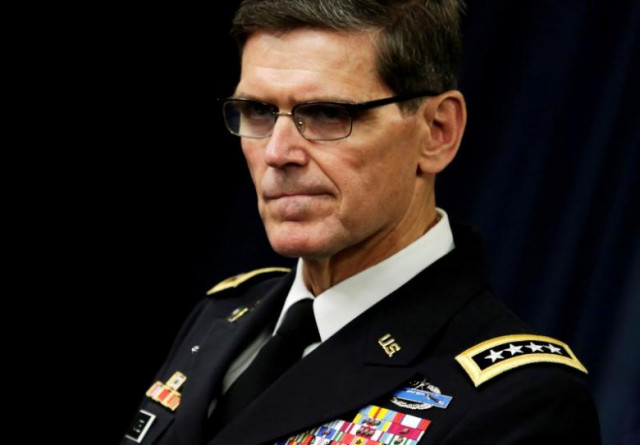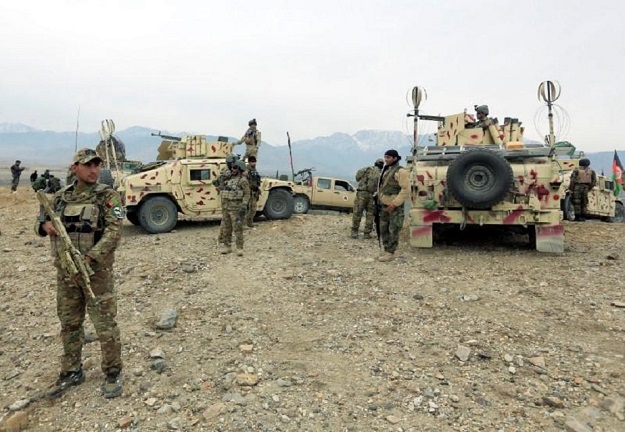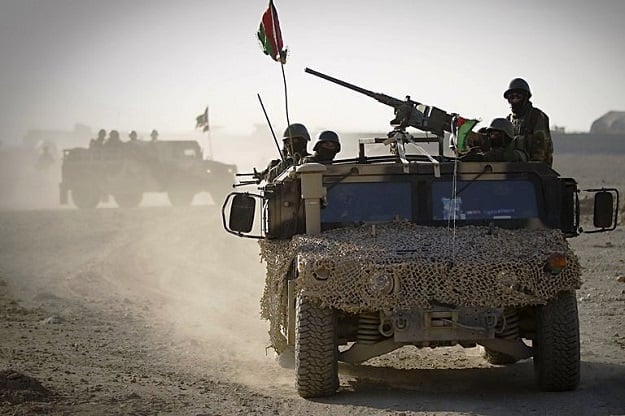Pakistan's equities will be ensured in any settlement of Afghan conflict: Centcom
Pakistan's 'equities' would be ensured in any agreement over Afghanistan conflict, says US Gen Votel

U.S. Army General Joseph Votel, commander, U.S. Central Command, PHOTO:REUTERS/Yuri Gripas
Commander of US Central Command General Joseph Votel, while testifying before the Senate Armed Services Committee, said “as a state possessing nuclear weapons that sits at the nexus of Russian, Chinese, Indian, Iranian, and US geopolitical interests, Pakistan will always retain its importance to the US".
In Afghanistan, peace is on the horizon
Votel added that any agreement for resolving the now 17-year-old conflict in landlocked Afghanistan would ensure Pakistan’s ‘equities’.
In light of recent efforts between Pakistan, the US, and Afghanistan to hold talks with the Taliban, the top US military official commended Pakistan’s efforts and cooperation with the State Department’s Special Representative for Afghanistan Reconciliation Zalmay Khalilzad.
 Afghan National Army (ANA) prepare for an operation against insurgents in Khogyani district of Nangarhar province. Photo: File/Reuters
Afghan National Army (ANA) prepare for an operation against insurgents in Khogyani district of Nangarhar province. Photo: File/Reuters“If Pakistan plays a positive role in achieving a settlement to the conflict in Afghanistan, the US will have opportunity and motive to help Pakistan fulfill that role, as peace in the region is the most important mutual priority for the U.S. and Pakistan”.
The CENTCOM chief also identified Afghanistan’s uncertain political situation as the greatest risk to stability in the region and said the US looks to Pakistan among others to play a constructive role in achieving peace in Afghanistan and the greater South Asian region.
“Our posture with Pakistan involves supporting our colleagues at the Department of State as they pursue a diplomatic solution with Islamabad to end the conflict in Afghanistan while ensuring that Pakistan’s equities are acknowledged and addressed in any future agreement.”
He also addressed the issue of violent and extremist organisations, as designated by the US and the UN, and their operations in "safe havens in both Afghanistan and Pakistan".
“Pakistan has not taken concrete actions against the safe havens of VEOs inside its borders. Similarly, VEOs located in Afghanistan conduct attacks inside Pakistan. This cross-border instability and violence generate tension along both sides of the border," claimed Votel during the Senate briefing.
Referring to the earlier suspension of US security assistance to Pakistan, Votel acknowledged that some military cooperation between Islamabad and Washington continues and the military cooperation is important to the US.
No timetable for US withdrawal from Afghanistan, asserts Khalilzad
During recent rounds of negotiations between the Afghan Taliban and stakeholders of peace in the war-torn country, President Ashraf Ghani is being pushed to the sidelines as the Taliban ignore his overtures for peace and negotiate instead with his friends, and enemies, over the future of Afghanistan.
From Doha to Moscow, the insurgents are meeting an array of envoys with competing interests in Afghanistan, from the United States eager to withdraw its troops to politicians in Kabul jostling for power.
Experts say regional powers — including US foes Iran and Russia — are angling for an audience with the Taliban, who are already outlining their vision for Islamic rule once foreign troops leave.
The elephant in the room is Ghani, whose US-backed administration has not been invited to the table despite a failed year-long effort to spark a dialogue with the Taliban.
Ghani’s allies in Washington insist Afghans should lead the peace process, and ostensibly the months-long push by the US to engage the Taliban has been aimed at convincing them to negotiate with Kabul. Those efforts culminated in an unprecedented six days of talks between the US and the Taliban in Doha in January.
“It’s a major snub because without the Americans, the government in Kabul cannot survive,” said Gilles Dorronsoro, a French researcher specialising in Afghanistan.




















COMMENTS
Comments are moderated and generally will be posted if they are on-topic and not abusive.
For more information, please see our Comments FAQ